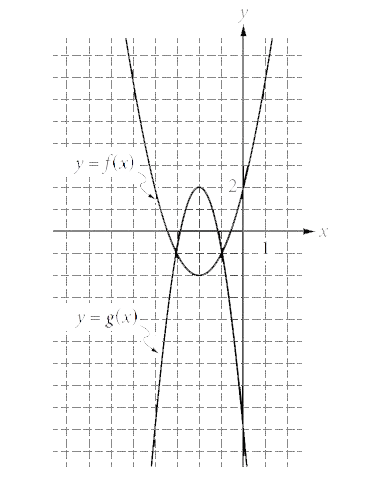For which of the following functions does f(x)f(2−x) ?
f(x)=x+2
f(x)=2x−x2
f(x)=2−x
f(x)=(2−x)2
The correct Answer is:B
To determine for which of the given functions f(x) satisfies the condition f(x)=f(2−x), we will evaluate each function one by one.
Step 1: Evaluate f(x)=x+2
1. Calculate f(2−x):
f(2−x)=(2−x)+2=4−x
2. Check if f(x)=f(2−x):
x+2≠4−x
This is not true for all x. Thus, this function does not satisfy the condition.
Step 2: Evaluate f(x)=2x−x2
1. Calculate f(2−x):
f(2−x)=2(2−x)−(2−x)2
Expanding this:
=4−2x−(4−4x+x2)=4−2x−4+4x−x2=2x−x2
2. Check if f(x)=f(2−x):
2x−x2=2x−x2
This is true for all x. Thus, this function satisfies the condition.
Step 3: Evaluate f(x)=2−x
1. Calculate f(2−x):
f(2−x)=2−(2−x)=x
2. Check if f(x)=f(2−x):
2−x≠x
This is not true for all x. Thus, this function does not satisfy the condition.
Step 4: Evaluate f(x)=(2−x)2
1. Calculate f(2−x):
f(2−x)=(2−(2−x))2=x2
2. Check if f(x)=f(2−x):
(2−x)2≠x2
This is not true for all x. Thus, this function does not satisfy the condition.
Conclusion
The only function that satisfies f(x)=f(2−x) is:
f(x)=2x−x2
f(2−x)=(2−x)+2=4−x
x+2≠4−x
This is not true for all x. Thus, this function does not satisfy the condition.
f(2−x)=2(2−x)−(2−x)2
Expanding this:
=4−2x−(4−4x+x2)=4−2x−4+4x−x2=2x−x2
2x−x2=2x−x2
This is true for all x. Thus, this function satisfies the condition.
f(2−x)=2−(2−x)=x
2−x≠x
This is not true for all x. Thus, this function does not satisfy the condition.
f(2−x)=(2−(2−x))2=x2
(2−x)2≠x2
This is not true for all x. Thus, this function does not satisfy the condition.
f(x)=2x−x2
Similar Questions
For which of the following functions f(0) exists such that f(x) is continuous at x=0 f(x)=1(log)e|x| b. f(x)=(cos(sin|x|x)) c. f(x)=xsin(πx) d. f(x)=11+2cotx
View SolutionFor which of the following functions f(0) exists such that f(x) is continuous at f(x)=1(log)e|x| b. f(x)=1(log)e|x| c. f(x)=x sinpi/x d. f(x)=11+2cotx
View Solution
Knowledge Check

Graphs of the functions f and g are shown in the xy-plane above. For which of the following values of x does f(x)+g(x)=0 ?A−3B−2C−1D0If f(x)=2x2+3, for which of the following values of x does f(x)=21?
A−9B−3C0D1If f(x)=cosxandg(x)=2x+1, which of the following are even functions?
I. f(x)⋅g(x)
II f(g(x))
III. g(f(x))Aonly IBonly IIConly IIIDOnly I and II
Draw the graph of the following function.
2f(x)
View SolutionIf f(x) is a real valued function, then which of the following is injective function ?
(i) f(x)=x5 (ii) f(x)=x+sinx
(iii) f(x)=x2 (iv) f(x)=ex
(v) f(x)=x3+x2+4x+4
View SolutionWhich of the following functions is/are bounded ? f(x)=2x1+x2,[−2,2]
View SolutionState which of the following functions are one-one and why?
f:R+→R+ defined by f(x)=1+x2
View SolutionFind the range of each of the following functions: f(x)=|x−3| f(x)=1−|x−2| f(x)=|x−4|x−4
View Solution